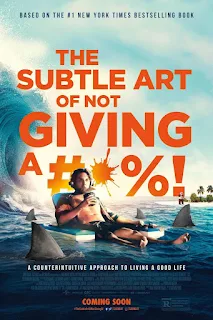Director: Nathan Price
Based on the book of the same name by Mark Manson (2016)
I have seen this book staring with sad eyes at me numerous times, pleading to be picked up. I always gave it a pass. Firstly, with profanity flashed on its cover, I thought the target readers must be Gen-Ys or millennials. They may find a reason to seek a book on self-help or, perhaps, perfect the art of not giving a damn about anything or whatever. I, on the other hand, was beyond help.
When a trailer bearing the same title appeared on Netflix, curiosity got the better of me.
After going through the documentary, I find that the content is more profound than its low-brow title. There is much philosophy to learn, as narrated from the life and times of the author, Mark Manson, by himself.
He started his teenage years on the wrong footing. Caught with drugs in his locker, he got into the wrong side of the law. His parents divorced afterwards. He drifted through his late teenage years and early adulthood in a daze, experiencing the death of a close friend and unfaithful girlfriend. Somewhere along the way, he received a sort of epiphany that made him question the purpose of life. That soul-searching gave birth to the book and, now, the documentary.
What I gathered from this presentation is this: The modern society feels that the purpose of life is to experience happiness. It constantly tries to avoid pain and anything that stirs the psyche and raises anxiety. Pain and tragedy are bad words that must be avoided at all costs. Through his personal life experiences, the author posits that pain and tragedy are the necessary evils that strengthen us. We become resilient to whatever curveballs that life throws. Like what Nietzsche said, probably parroting Vedanta's teachings, events in life are cyclical. Things get better and turn for a dip every so often.
The current Western teaching where happiness is the be-all and end-all of everything, we end up feeling entitled. We demand nothing else but to be satisfied. We want to be in control all the time.
The author thinks that a nihilistic outlook on life leads to more contentment. We should realise that we do not control anything. Everything is beyond our control. We should be humble enough to know we are mortal, just waiting to die. Being cocksure about something may lead to our downfall, exemplified by the example of Lt. Hiroo Onoda, the last Japanese WW2 soldier to leave the Philippines in 1974. He spent a good 29 years in the jungle, convinced that Japan was still at war. Despite numerous attempts at bringing him back, he was confident that the whole exercise was fake news. What a waste of fruitful years of life?
Be ordinary; that is what he is saying.
You are nobody. You are not unique, which contradicts what the psychological community and management gurus say. The modern world tells each of us that we are entitled, and the rest can just go to hell. The 'me' as the centre of reference disappoints us when things do not go our way because, in our mind, we are special.
Many may not agree with his rhetoric. People need to think outside the box. Society needs mad people who can push the boundaries and would not stop at any extent to prove their point; civilisation needs them.









No comments:
Post a Comment